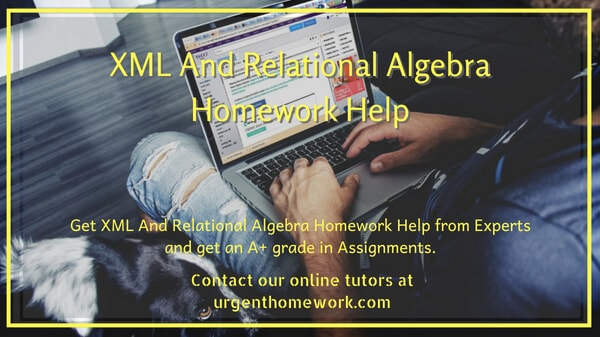XML And Relational Algebra Homework Help
What is XML?
- XML means extensible Markup Language.
- XML is made to transport and store data.
- XML had been made to transport and store data.
- HTML had been made to display data.
- XML is really a markup language similar to HTML.
- XML had been made to carry data, not to show data.
- XML tags aren't predefined. You have to determine your own tags.
- XML is made to be self-descriptive
Relational Algebra
Relational algebra, a good offshoot associated with first-order-logic, deals with a set of finitary relations that is closed under certain operators. These operators operate on a number of relationships to yield a relation. Relational algebra is actually part of computer science.
Relational algebra obtained little attention outside of real math until the publication of E.F. Codd's relational model of data in 1970. Codd suggested this algebra like an algebra as a basis for database query languages.
Relational algebra is basically equal within expressive power to relational calculus; this particular outcome is called Codd’s theorem. You must be careful to prevent a mismatch, that could occur between the two languages since negation, put on the method from the calculus, constructs a method that may be true on an infinite set of possible tuples, while the difference operator of relational algebra always returns a finite result. In order to conquer these types of issues, Codd restricted the operands of relational algebra to finite relations only and also proposed restricted support for negation (NOT) as well as disjunction (OR). Analogous restrictions are simply in several other logic-based computer languages. Codd described the word relational completeness to refer to a language that is complete with respect to first-order predicate calculus apart from the restrictions he proposed. In practice the restrictions have no adverse effect on the applicability of his relational algebra for database purposes.

Topics in database
- Authorization: SQL Recursion
- Big Data
- Database and data science techniques
- Database Languages Assignment Help
- Database Design Help
- Database System Architectures Design
- Entity Relationship Model Understanding
- Higher-Level Design: UML Diagram Help
- Implementation Of Atomicity And Durability
- Object-Based Databases Homework Help
- Oracle 10g/11g
- Parallel And Distributed Databases
- Query Optimization Technique
- Relational Databases Homework Help
- Serializability And Recoverability
- SQL Join
- SQL Queries And Updates
- XML And Relational Algebra Homework Help
- XML Queries And Transformations
- Data Mining
- Oracle Data warehouse
- Relational Model Online Help
- SQL And Advanced SQL Learning Help

